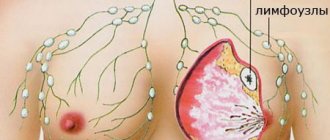Acetone smell from the mouth is an alarming symptom, indicating a number of pathological processes in the human body. The causes of the smell of acetone on the breath are associated with a sharp increase in the content of ketone bodies in the systemic bloodstream - this is the body’s response to a stressful situation, in which normal lipid, carbohydrate and protein metabolism is disrupted.
The presence of ketone bodies in the blood in a certain amount is considered normal, which does not in any way affect the general well-being or the functioning of internal organs and systems. If the amount of these substances increases, acetone and its derivatives begin to “harm” the metabolism.
Symptoms
The smell of acetone from the mouth of an adult is accompanied by weakness, nausea, and a constant feeling of anxiety. Urinalysis confirms kenoturia. More severe forms of acetone halitosis are accompanied by shortness of breath, abdominal pain, chills, nausea, increased dry skin, and confusion. In critical cases, the taste of acetone in the mouth is accompanied by signs accompanying the course of a diabetic coma (the patient has a fever and loses consciousness).
Diabetes mellitus is the most common cause of acetone breath in children and adults
Most often, the aroma of acetone solvent in the mouth in adults occurs after drinking alcohol in high doses, and is also a classic symptom of diabetes mellitus types 1 and 2. Other causes of the problem are prolonged fasting or strict diets, tumor formations in the thyroid gland. In case of nephropathies (failures in liver function), acetonemia is accompanied by the smell of ammonia.
The appearance of acetone odor from the mouth of a child or an adult may be preceded by an increase in body temperature (increased metabolic processes, which are accompanied by chemical reactions with the release of heat). An excess of acetone compounds in the blood leads to nausea and vomiting. Due to the fact that “overloaded” kidneys cannot normally cope with the increased content of ketones (remove them from the body), they begin to “leave” the lungs - a chemical odor of acetone appears from the mouth.
Important! Due to the high risk of developing acetone halitosis during ARVI, therapists recommend drinking plenty of fluids (at least 2.5–3 liters of fluid per day) throughout the entire treatment period.
Migraine and acetone crisis have similar symptoms: intense headache of different localization, increased sweating, nausea, vomiting, dizziness. But with migraines, the breath does not stink of acetone, and urine and blood tests do not show an increase in the level of ketone bodies.
Poor nutrition
Sometimes it can be very difficult to determine why a person smells of acetone. After all, the examination does not reveal any pathologies in him. In this case, you need to pay attention to your diet. The cause of an unpleasant odor may be a diet with insufficient amounts of carbohydrate foods.
Quite a few people are into ketogenic diets these days. This diet involves a sharp restriction of carbohydrates and a large amount of fat in the diet.
The keto diet is believed to lead to rapid weight loss. However, such a menu can provoke serious metabolic disorders. With a carbohydrate deficiency, active fat burning occurs. In the process of accelerated lipid metabolism, an excess of ketone bodies is formed, which do not have time to be excreted from the body. These substances negatively affect the tissues of the liver, kidneys and pancreas.
If a person smells of acetone, then he needs to immediately review his menu. Otherwise, it can lead to serious pathologies. An acetate smell signals a severe carbohydrate deficiency. In this case, you need to urgently stop following the ketogenic diet.
It is not uncommon for a person to smell like acetone on their breath during a complete fast. The ketone odor is formed by the same mechanism as in diabetes mellitus. During a long period of fasting, the body begins to use its own fat reserves as an energy source. This releases a large number of ketone bodies. These substances have a toxic effect on organs. Therefore, it is better to avoid starvation diets. Excessively long breaks between meals should also be avoided.
Causes and signs of childhood acetone halitosis
Why a child’s breath may smell like acetone: as a rule, in infants and children under 5 years of age, this sign indicates that the internal organs and metabolism are not fully formed and functioning properly. The smell of acetone from a child’s mouth can be primary and secondary. In the first case, the problem is caused by an unbalanced diet and periodic fasting. In the second situation, the acetone aroma indicates a certain disease (endocrine disorders, somatic disorders, infections, tumor processes).
Symptoms of secondary halitosis in newborns and adolescents are identical:
- lack of appetite;
- acetone odor from the mouth;
- severe vomiting;
- intestinal disorders;
- nausea;
- increased levels of acetone in urine and blood.
Acetonemia in a newborn baby may be a genetically determined phenomenon. It is noteworthy that factors such as physical fatigue, mental overexcitation, and climate change can provoke the appearance of a characteristic taste in a child’s mouth. The presence of acetone odor in adolescents is an indicator of pathological malfunctions of the thyroid gland, the initial stages of type 2 diabetes mellitus, dysfunction of the gastrointestinal tract, infectious and inflammatory diseases occurring in chronic and acute forms.
Poor nutrition, renal and hepatic dysfunction, endocrine disruption in the body are factors that can lead to the taste of acetone on the oral mucosa
Infections
If a person smells of acetone on their body, this may be a sign of infectious diseases. Such pathologies are accompanied by severe intoxication of the body. The ketone odor usually appears during the acute stage of the disease, when the patient has a sharply elevated temperature.
Most often, ketoacidosis is observed with rotavirus infection. This disease is commonly called “stomach flu”. It is most often transmitted through dirty hands, less often through airborne droplets. Signs of infection with rotavirus are as follows:
- sore throat (in the first days of illness);
- diarrhea (the color of feces becomes gray);
- fever;
- frequent vomiting;
- severe weakness.
Why does a person’s body smell like acetone during rotavirus infection? During vomiting and diarrhea, the patient loses a large amount of fluid. In addition, fever is accompanied by severe sweating. This leads to dehydration and poor carbohydrate metabolism. Ketone bodies begin to accumulate in the body, which is the cause of the smell.
No special drugs have been developed against rotavirus. Therefore, treatment can only be symptomatic. During illness, you should try to drink as much fluid as possible. This will help avoid dehydration and the accumulation of ketone bodies.
Solution
To get rid of acetone halitosis, you should first of all establish the reason for this alarming symptom. As a rule, acetonomia accompanies the course of certain diseases; therefore, the main treatment should be aimed specifically at them. Thus, insulin-dependent diabetes mellitus (type 1) is an indication for lifelong insulin injections in the dosage prescribed by the doctor; for type 2 of this disease, sugar-lowering drugs are selected to normalize blood glucose levels.
With acetonemic coma (syndrome) in a child, the situation is much more complicated. It “starts” with attacks of nausea and vomiting, which, in turn, lead to an abnormal decrease in blood glucose levels. In this case, drug therapy is aimed, first of all, at normalizing this indicator and restoring the “knocked down” water-electrolytic balance. Thus, children are recommended to drink herbal teas and dried fruit compotes. In addition, drugs against dehydration of the body (Regidron, Humana-electrolyte) are prescribed without fail.
Important! After attacks of nausea and vomiting caused by acetonemia, medicinal solutions are drunk in small portions (5–15 ml every 10–15 minutes).
If the smell of acetone from the mouth is accompanied by acute pain in the abdomen of unclear localization, uncontrolled vomiting, or deterioration in general health, it is necessary to urgently seek help from a doctor and undergo treatment in a hospital. Physiotherapy also helps to remove the acetone smell: for example, patients (regardless of age) are prescribed alkaline mineral waters (Luzhanskaya, Borjomi). It may be advisable to conduct a course of warm alkaline enemas (the medical task is to eliminate acidosis). Before giving a soda enema, the large intestine is thoroughly cleansed of accumulated toxins.
Traditional methods
Bitterness in the mouth after eating
What to do for mild forms of acetonemia (for example, during fasting): seek help from proven home remedies. It is important to understand that such measures are purely symptomatic and help improve digestion and metabolism.
In the morning, if you have a carbide smell from your mouth, it is useful to drink rosehip decoctions, infusions, as well as cranberry and sea buckthorn juices. These berries have a beneficial effect on the body's immune defense, stimulate intestinal motility, and normalize metabolism.
Blackberries are a healing berry that will help cope with acetone halitosis against the background of:
- diabetes mellitus;
- chronic enteritis;
- food dysentery;
- for aphthous stomatitis and inflammatory gum diseases.
Blackberry fruits contain a lot of components useful for the human body - organic acids, vitamins E, C, carotene. So, 1-2 tbsp. l. centaury is steamed with a glass of boiling water, left for 5 minutes, and drunk in small portions throughout the day. This plant copes with the taste of acetone against the background of gastritis with hypersecretion of gastric juice, with digestive disorders, fevers, vomiting, and diabetes. In addition, centaury is an excellent antiallergic and choleretic agent.
Folk remedies (berry and fruit juices, decoctions, infusions of medicinal plants) help to cope with discomfort in the mouth due to diets or fasting.
Diet
Those who feel an acetone taste in their mouth should adhere to a certain diet and generally adjust their daily menu. So, during periods of exacerbation of the disease - the root causes of halitosis - fried, fatty, protein foods, baked goods, whole milk, as well as fresh fruits and vegetables are excluded from the diet. It is recommended to eat exclusively light meals that are quickly digested and do not “overload” the organs of the digestive tract. These are, first of all, light porridges cooked in water, crackers, and baked apples.
After 2–3 weeks, you can add bananas, boiled lean meats, and fermented milk products to the menu.
How to get rid of odor
What to do if a person smells of acetone? You can completely get rid of an unpleasant odor only after eliminating its cause. Therefore, first of all, you need to treat the underlying pathology and avoid too strict diets.
The following recommendations from doctors will also help reduce the odor:
- You should try to consume enough fluid.
- Long breaks between meals should be avoided.
- You should shower regularly and use antibacterial soap.
- Wearing clothes and underwear made from natural fabrics will help reduce sweating.
- It is recommended to use deodorants with zinc and aluminum.
The acetone smell is a rather dangerous symptom that should never be ignored. Timely treatment will help avoid intoxication of the body and damage to organs from ketones.
Prevention and prognosis
Men and women suffering from acetone halitosis and who seek help from a doctor in time, with the right treatment tactics, fully recover. In children, the frequency and intensity of acetonemic crises gradually decrease with age.
Preventive actions:
- rational daily routine;
- lack of stress and overwork;
- The duration of night sleep should be at least 8 hours;
- regular walks in the fresh air;
- moderate physical activity;
- balanced diet.
So, acetone smell from the mouth is a symptom of “problems” in the functioning of various organs and systems. To establish the cause of the problem and choose the right treatment, you must promptly seek help from a doctor.
Diagnostic measures
Diagnostic features depend on the preliminary diagnosis. The patient may be asked:
- Pass the UAC and BAK. Based on their results, it will be possible to understand whether there is an inflammatory process and whether the kidneys and liver are functioning normally.
- Donate blood for hormones. First of all, insulin levels are always determined to confirm or deny the presence of diabetes. Women may have their blood taken to determine hCG, progesterone, and estrogen.
- Undergo an ultrasound examination. During an ultrasound, the condition of the kidneys, liver, and pancreas is checked.
- Get a computed tomography scan of the abdomen and an MRI of the brain.
In each specific case, the diagnostic package is unique. A personal approach allows the doctor to immediately make the correct diagnosis and select effective treatment for the patient. The fight against acetone odor is always aimed at eliminating the root cause. Therefore, there cannot be a single scheme for overcoming an uncomfortable symptom.










